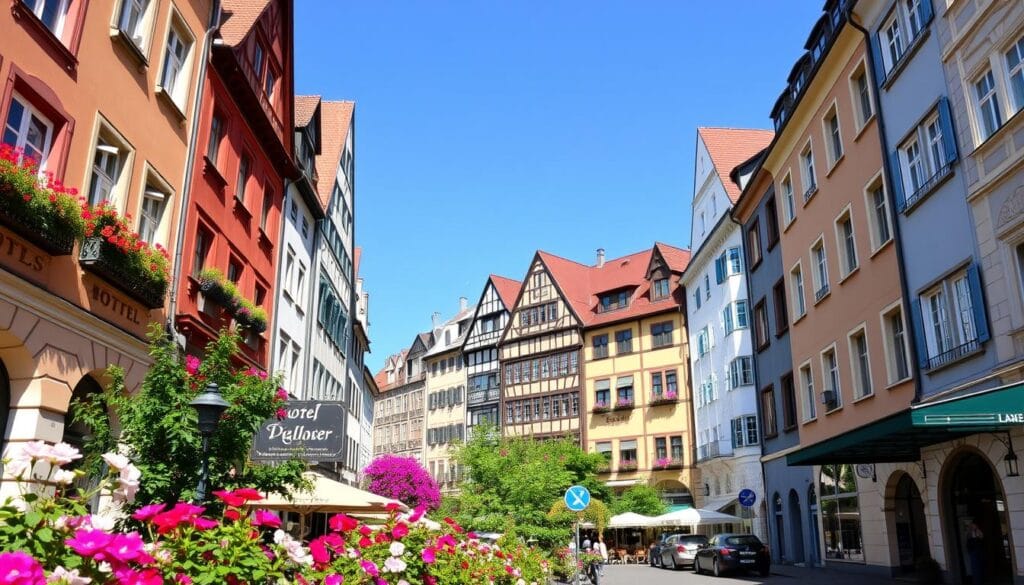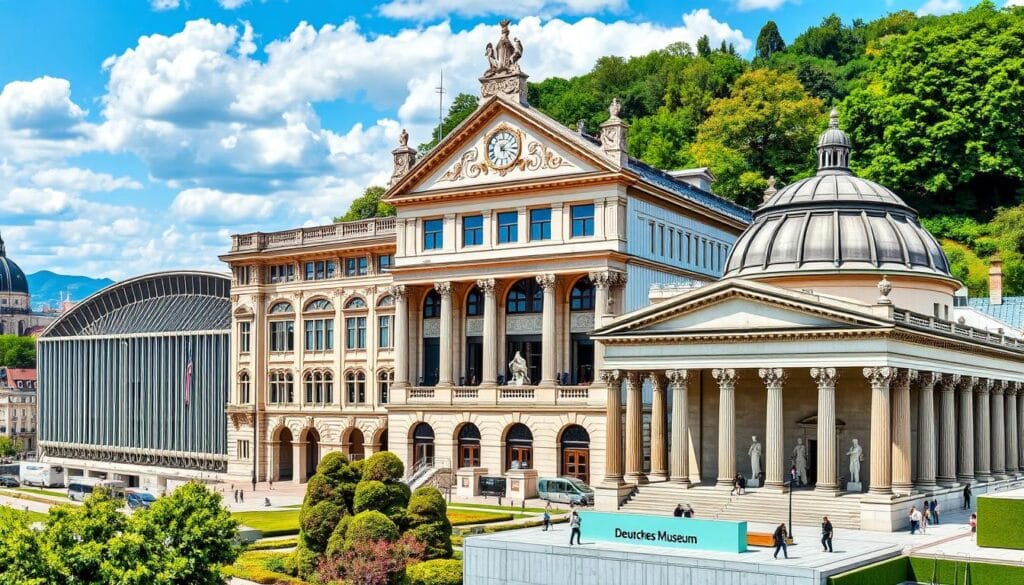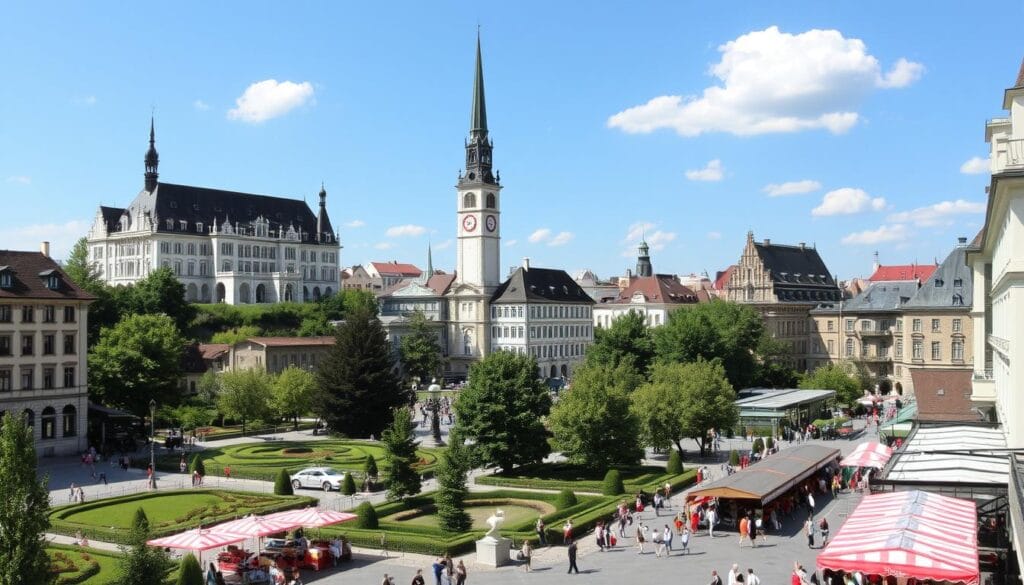As you stand in Munich’s heart, the Glockenspiel’s chime calls you to explore. This Bavarian gem is a mix of old culture and new life. It has something for everyone, from grand buildings to Oktoberfest fun.
Munich’s streets and museums tell stories of the past and present. You’ll love the old town’s charm and the BMW Museum’s innovation. Enjoying local food and traditions will make your visit unforgettable.
Table of Contents
Introduction to Munich: Bavaria’s Captivating Capital
Munich, the capital of Bavaria, is a city that mixes history with modern culture. It was founded in 1158 and has become a top spot for munich sightseeing, munich culture, and amazing architecture. It’s perfect for those looking for a memorable trip.
Best Time to Visit Munich
The best time to visit munich is from March to May. The city is full of life with flowers blooming and nice weather. But, Munich’s winters are also special, with lights and decorations for Christmas.
Why Choose Munich as Your Destination
Munich is special because it combines old Bavarian culture with modern comforts. It’s famous for its lively munich culture, especially its beer and Oktoberfest. You can dive into history, see top museums, and try local food.
Understanding Munich’s Culture
Munich’s culture is a mix of old Bavarian ways and new city life. Its buildings show this mix, from the Old Town’s styles to the modern Pinakothek der Moderne museum. Places like the Residenz palace and biergartens offer a fun and open cultural experience.
“Munich is a place that really inspires you to explore and discover. The city’s rich history, vibrant culture, and stunning architecture make it a truly captivating destination.”
Getting to Munich: Transportation and Travel Options
Munich, the captivating capital of Bavaria, offers a range of convenient transportation options for visitors. The city’s main gateway, Munich International Airport (MUC), is located just 28.5 km northeast of the city center. It provides both commercial and private jet services. For a luxurious arrival, consider utilizing the airport’s private jet terminals or first-class lounges.
Within Germany, high-speed trains provide comfortable and efficient travel options to Munich. Once you’ve arrived in the city, you’ll find an extensive and reliable public transit system. This includes the U-Bahn (subway) and S-Bahn (commuter rail) networks, trams, and buses. The Munich public transport system is well-connected, with barrier-free access and accessibility features in most stations.
For added convenience, taxis and ride-sharing services like Uber and SIXT ride are readily available. Visitors can also explore the city by bike. Munich has a well-developed network of bike lanes and bike-sharing schemes like MVG-Rad. Electric scooters and mopeds are another popular option for getting around Munich.
To make the most of your travel to Munich, consider purchasing a München Card or a Group Day Pass. These offer discounted access to public transportation and various attractions. The Deutschlandticket at 49 euros also provides unlimited use of public transport in Munich and surrounding areas.
| Transportation Option | Cost and Details |
|---|---|
| Single Ticket (Einzelfahrkarte) | €3.90 for Zone M, valid for 2 hours in one direction |
| Day Ticket (Tageskarte) | €9.20 for unlimited travel in a day, recommended for more than 2 trips |
| IsarCard (Weekly or Monthly) | Flexible options for longer stays in Munich |
| Taxis | Minimum fare of just under €5, plus distance-based charges |
| Bike Rentals | Hourly or daily rentals available, with discounted tickets for public transport |
Whether you’re flying to Munich or arriving by train, the city’s extensive transportation network ensures a seamless and efficient journey. This allows you to explore the city’s captivating sights and experiences with ease.
Munich Travel Guide: Essential Planning Tips
Getting ready for your Munich trip? Here are key tips for a smooth visit to this amazing Bavarian city.
Travel Documents and Requirements
Many countries need a valid passport to get into Germany. You might also need a Schengen visa. Always check the latest entry rules before you go.
Currency and Money Matters
The Euro (EUR) is Munich’s official money. You can exchange currency at banks, airports, and exchange offices near the central station. Credit cards are common, but cash is better for small buys and tips.
| Currency Information | Details |
|---|---|
| Currency | Euro (EUR) |
| Cash Carrying Limit | Travelers entering or leaving Germany must declare cash or equivalents totaling €10,000 or more |
| VAT (Sales Tax) | 19% on most items, with a reduced 7% rate for groceries, books, and certain venues |
| Credit Cards | Widely accepted, but cash is recommended for smaller establishments |
Language and Communication Tips
German is the official language, but many speak English well, especially in tourist spots. Learning basic German phrases helps a lot. Remember, the Bavarian dialect can be tough, even for Germans.
With these munich travel tips, munich travel requirements, and munich currency tips, you’re set for a great time in Munich. Enjoy your trip!
Where to Stay: Top Neighborhoods and Accommodations
Munich offers a wide range of places to stay, from fancy hotels to cozy inns. Whether you’re looking for luxury or something more affordable, there’s a spot for you. Here are the best areas to stay in Munich:
- Altstadt (Old Town) – This historic area is the heart of Munich. It has famous landmarks, lively streets, and many hotels, like the Bayerischer Hof.
- Maxvorstadt – This neighborhood is known for its universities and museums. It’s a cultural hotspot and a favorite for munich hotels.
- Schwabing – This area was once bohemian and is now trendy. It has a variety of munich accommodations, from small boutiques to modern buildings.
If you want luxury, try the Rosewood Munich, The Charles Hotel, or Mandarin Oriental Munich. For a budget-friendly option, consider the 25hours Hotel The Royal Bavarian or Le Méridien Munich.
Booking through certain services can give you extra perks. You might get room upgrades, late check-outs, or special access to amenities. With so many best areas to stay in munich and munich hotels to pick from, you’ll find the ideal place for your trip to this amazing Bavarian city.

Munich’s Historical Landmarks and Architecture
Munich, the capital of Bavaria, is a city that mixes old history with new architecture. It has famous landmarks in the historic center, grand religious buildings, and big palaces. Visitors can explore many architectural wonders here.
Historic City Center Highlights
Marienplatz is at the heart of Munich. It has been a key meeting spot since the 12th century. The New Town Hall, built from 1867 to 1909, stands out here. Its Glockenspiel is famous for its mechanical clock show.
Religious Buildings and Palaces
Munich’s buildings include beautiful religious sites. The Frauenkirche is a late Gothic wonder with twin towers seen all over the city. The Asam Church has a stunning Baroque inside.
The Nymphenburg Palace and the Munich Residenz show the city’s royal past. They have styles from Renaissance to Rococo.
Modern Architectural Marvels
Munich also has modern buildings. The BMW Welt is a futuristic showroom for BMW. The Olympic Park has a glass-and-steel roof that’s now a city symbol.
Munich’s buildings show its history and growth. From old churches to new buildings, Munich landmarks, Munich architecture, and Munich historical sites make the city special.
Art and Culture: Museums and Galleries
Dive into Munich’s rich artistic world. The city is home to top museums and galleries. Kunstareal, or “art district,” is a treasure trove for art fans. It has 18 museums, over 40 galleries, and more.
Don’t miss the Alte Pinakothek. It’s filled with German art from the 14th to 18th centuries. The Deutsches Museum and Pinakothek der Moderne are also must-sees for their vast collections.
Exciting exhibitions are coming up. The Glyptothek will show “Myth & Modernity: Fritz Koenig and Antiquity” from November 2024 to March 2025. The Alte Pinakothek will feature “Rachel Ruysch (1664–1750): Nature into Art” during the same period.
Modern art lovers will enjoy the Haus der Kunst’s “Velvet Terrorism: Pussy Riot’s Russia” exhibit from September 2024 to February 2025. The Lenbachhaus will display “The Blue Rider: A New Language” until March 2025.
Munich’s museums and galleries offer a unique cultural journey. Explore the city’s art heritage and feel the energy of Kunstareal.

“Munich has become a leading metropolis of art in Europe, thanks to the vision and acquisitions of King Ludwig I of Bavaria in the 19th century.”
Exploring Munich’s Parks and Gardens
Munich is a city that mixes city life with green spaces. It offers a chance to enjoy nature in the city. From the famous English Garden to hidden spots like Olympia Park, there’s plenty to do outside.
English Garden Highlights
The English Garden is Munich’s top park, covering 910 acres. It has 78 kilometers of paths for walking, jogging, or biking. The Eisbachwelle, a natural wave, is a hit with surfers.
Hidden Green Spaces
Besides the English Garden, Munich has other green spots. The Nymphenburg Palace and its gardens offer a calm escape. The Munich Residenz also has beautiful grounds, with historic buildings as a backdrop.
Outdoor Activities
Munich’s parks are great for more than just walks. You can rent bikes and explore the city’s bike paths. The Olympic Park is perfect for jogging, cycling, and seeing the city from the Olympic Tower.
Looking for peace or adventure? Munich’s parks and gardens have it all. From the famous English Garden to secret spots, they offer a perfect mix of nature and city life.
| Park/Garden | Key Features | Area |
|---|---|---|
| English Garden | Largest city park in Germany, Eisbachwelle (river surfing spot) | 910 acres |
| Nymphenburg Palace Gardens | Baroque architecture, expansive gardens | 600+ meters |
| Munich Residenz Gardens | Manicured grounds surrounding historic palace | N/A |
| Olympic Park | Site of 1972 Summer Olympics, Olympic Tower | 2.7 million sq. meters |
Culinary Experiences: From Beer Halls to Fine Dining
Munich is a city that loves its food, offering many dining options. You can enjoy traditional Bavarian dishes in famous munich beer halls or try new flavors at Michelin-starred munich restaurants. The munich cuisine is a mix of local traditions and international tastes.
The munich beer halls are at the heart of the city’s food scene. Places like the Hofbräuhaus and Augustiner-Keller are known for their beer and food. They serve classic Bavarian dishes like pretzels and schnitzel, paired with fresh munich beer.
For a more upscale dining experience, Munich has many Michelin-starred restaurants. Atelier and Tantris are known for their creative and beautiful dishes. Don’t miss the Viktualienmarkt, where you can find fresh produce, cheeses, and Bavarian treats.
- Explore the historic munich beer halls like Hofbräuhaus and Augustiner-Keller, where you can savor traditional Bavarian fare and the finest munich beer.
- Discover the innovative munich cuisine at Michelin-starred restaurants such as Atelier and Tantris, where culinary masterpieces are crafted with the freshest local ingredients.
- Immerse yourself in the vibrant atmosphere of the Viktualienmarkt, Munich’s renowned open-air market, and indulge in a variety of local delicacies and artisanal products.
Whether you prefer the lively munich beer halls or the fancy Michelin-starred places, Munich has something for everyone. It offers a memorable dining experience that celebrates the city’s culture and food.
| Munich Beer Halls | Munich Restaurants |
|---|---|
| Hofbräuhaus (founded in 1589) | Atelier (Michelin-starred) |
| Augustiner-Keller (founded in 1812) | Tantris (Michelin-starred) |
| Löwenbräukeller (opened in 1883) | Viktualienmarkt (open-air market) |
Shopping Districts and Local Markets
Munich has a wide range of shopping spots. You can find everything from high-end boutiques to traditional markets. It’s the perfect place to find souvenirs to remember your trip.
Luxury Shopping Areas
Maximilianstraße is the top spot for luxury shopping in Munich. It’s lined with famous brands like Armani and Louis Vuitton. The beautiful architecture adds to the luxury feel, making it a favorite among shoppers.
Traditional Markets
Viktualienmarkt is a 200-year-old food market. It’s filled with fresh produce, meats, and cheeses. You can also find traditional Bavarian goods like dirndls and beer steins.
Souvenir Shopping Tips
- Look for specialty shops in the city center for authentic Bavarian souvenirs.
- Kaufingerstraße is a lively street with a variety of shops and vendors.
- Check out the Englischer Garten for outdoor-inspired gifts.
Munich’s shopping areas and markets have something for everyone. Whether you’re looking for luxury items, local treats, or unique souvenirs, you’ll find it here. It’s a shopping experience like no other in Bavaria.
| Location | Highlights | Prices |
|---|---|---|
| Maximilianstraße | International luxury brands, renowned jewelers, art galleries | High-end, expensive |
| Viktualienmarkt | Traditional food market, local produce and specialties | Moderate to affordable |
| Kaufingerstraße | Mix of boutiques, department stores, and souvenir shops | Varied, from affordable to mid-range |
Day Trips and Excursions from Munich
Munich is a great place to start exploring Bavaria’s beautiful landscapes and historical sites. You can see medieval castles, learn about World War II, or enjoy the stunning natural views. There are many day trips you can take from Munich.
One top spot is Neuschwanstein Castle, a 1 hour and 45-minute drive from Munich. This 19th-century palace was built by King Ludwig II. It’s a masterpiece of architecture and a must-see.
For history buffs, Dachau Concentration Camp Memorial Site is a must-visit. It’s just 30 minutes from Munich. The camp held 200,000 prisoners from 1933 to 1945, with 30,000 deaths.
Nature lovers should check out the Bavarian Alps. Places like Königsee and Walchensee offer beautiful views, clear lakes, and hiking trails. It takes about 2 hours by car to get there from Munich.
The town of Rothenburg ob der Tauber is another lovely spot. It’s on the Romantic Road, a scenic path through medieval towns. You can get there in 2 hours by train from Munich.
Nuremberg is a great choice for history, architecture, and culture. It’s just an hour from Munich by train. You can see the medieval old town, Kaiserburg castle, and the Nuremberg trials memorial site.
| Destination | Travel Time from Munich |
|---|---|
| Neuschwanstein Castle | 1 hour, 45 minutes |
| Dachau Concentration Camp Memorial Site | 30 minutes |
| Königsee | 2 hours |
| Walchensee | 1 hour |
| Rothenburg ob der Tauber | 2 hours (by train) |
| Nuremberg | 1 hour (by train) |
Munich is a great base for day trips and excursions in Bavaria. Its good transport links and close proximity to attractions make it ideal.
Conclusion
Munich, the heart of Bavaria, is a mix of history, culture, and modern life. It’s a top spot for travelers looking for a memorable trip. Whether you’re planning a visit or just dreaming of it, Munich has something special for everyone.
The city is famous for Oktoberfest and its beer halls. It also boasts stunning landmarks, museums, and parks. Munich’s easy-to-navigate center and good public transport make exploring a breeze. You can dive into the local culture and see all the city has to offer.
When you visit Munich, be sure to enjoy its mix of old and new. This guide will help you make the most of your trip. Whether you’re there for a weekend or a week, you’ll make memories that last. So, start planning your trip to Munich and get ready for an amazing adventure.

